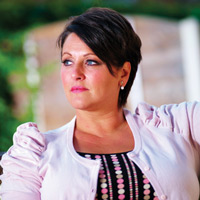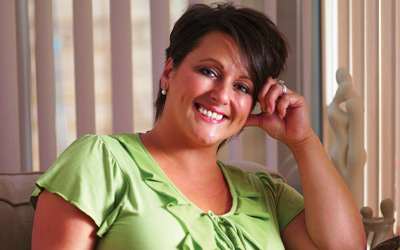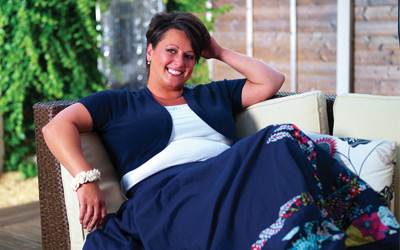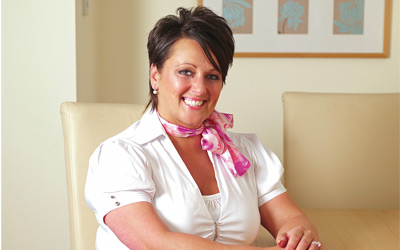 Hayley Taylor made her first step into the public eye when she was featured in Channel 4’s Benefit Busters – but it’s as the solo star of The Fairy Jobmother that she’s won a place in our hearts…
Hayley Taylor made her first step into the public eye when she was featured in Channel 4’s Benefit Busters – but it’s as the solo star of The Fairy Jobmother that she’s won a place in our hearts…
Hayley’s sympathetic – but no-nonsense – approach to helping the jobless get a foot on the career ladder has won her plaudits and fans throughout the country (and across the Atlantic too, with a US series under her belt). Now, in an exclusive interview with Careers, we look at how it all began – and where she can go from here…
Careers: Hayley, it’s been a bit of a whirlwind for you over the past couple of years, being propelled into the limelight as the Fairy Jobmother, with a successful TV series and meetings with some of the most powerful people in the country. Can you tell us how it all began?
Hayley: When I left school, all I ever wanted to be was a hairdresser. I am quite a creative person and I love talking to people, and communicating with them, so for me that was the ideal avenue to go down. I went to college for three years, got my qualifications, and worked for seven different salons. Then at 24, I went to work for a salon that had a training school above it, for women returning to hair dressing after raising families, to update their skills – and it was also for unemployed individuals to come into the career of hairdressing. One day the tutor who took the lessons in the training school was off work; I did not have any clients booked in, and the manager said “We have a group of unemployed starters: why don’t you take the lesson?”
I thought “Oh my God! What am I going to do with them?” They were a bunch of thirty 16-year-olds wanting to be the next Vidal Sassoon – and I didn’t even know what a lesson plan was… I honestly had no clue how to deal with them. But I thought, well, in for a penny, in for a pound…I thought I would have to come up with something to hold their attention: we had a broken telephone downstairs in the salon, and I thought, that’s the first point of call, booking an appointment. So I got the phone and ran back upstairs and started doing reception work with them, picking up the phone and making silly noises and silly voices, pretending that I was an old lady wanting a shampoo and all these kinds of things – and at the end of the lesson, they told me: “Miss we absolutely loved it! Can we have you again?” And it was literally like – and I always say this – a thunderbolt moment. I was more interested in these unemployed individuals than I was about hairdressing. The fascination completely hit me then. Now I am 44 and it’s still not gone away
Then I had some really difficult periods within my own life – my husband lost his job that he had done for 10 years, we had a young baby and I stayed at home raising my daughter, and we struggled financially and in so many ways – and I actually lost my confidence. When I was with my daughter staring at the four walls all day, I thought I had gone straight from what I thought I was – this strong career woman – into this mother and not myself: I was Morgan’s mother not Hayley.
I really wanted to get back into work and I just did not feel I had enough confidence to do so. So I did some voluntary work for a charitable organisation – I thought that would get me talking to people again – and this charitable organisation was so pleased with the work I had done, they decided to open a charitable retail outlet, where they gave me an assistant manager’s position; then two weeks later they sacked the manager and they gave me a manager’s position. The government-funded training organisation sent trainees to me within this organisation to train up on charitable retail and I did so well at it, that I really discovered that I was meant to teach.
Then a TV studio came around looking for people to take part in a documentary about the benefit system and they happened to come into my office one day, to see what we were doing to help the unemployed back to work. And actually I was quite rude to them! I said: “Listen, my class starts at 9. And it is 9 now and I need to be with the people I am teaching. You do what you have to do, but I need to teach. You are going to have to sit down and listen: you can participate if you want but you cannot interrupt because to me nobody is more important than the people I am working with.” And they loved it: some of the other tutors were like “come and sit in my class and see how good I am” – and I could not have cared less.

Careers: But when they offered you a role at the heart of their programme you took it.
Hayley: To start with I did not want to do it. I came home and told my husband, and said I had doubts – but he said, “We have never lived a life of ‘what if’ – we have always taken chances.” So we sat down and talked about it, and the impact on our lives, and I realised that if I turned this down I would miss an opportunity to get the really big issues out there. So I decided to do it. The programme was Benefit Busters and when it went out it was really strange seeing myself out in the pick of the day on the TV. It was quite nice in one respect, and quite harsh in another, and that was really difficult for me.
Careers: Why difficult?
Hayley: When it aired I woke up the next morning and thought “What have I done?” Because some of the feedback was horrible: “Who does she think she is?” “She is a bully!” “She is patronising.” And saying I was fat, I was demeaning them, I was making them cry, I was getting people jobs in Poundland that were only temporary jobs (and by the way, three of them are still there two years later, and one’s a seasonal goods buyer…): these perceptions people had of me, that I feel are nothing like me, were so hard to sit and read – to the point that I could not read the reviews because they were so horrible. That was to me really a huge setback.
We had obviously taped it and I kept watching it back, and kept questioning my methods and how I did what I did. Then, at the end of the day, all the people I worked with that day on that episode told me I was really good, and that they couldn’t believe people were saying those things: “You are nothing like how they are portraying you, don’t worry!” And I thought: whose opinion really matters?
So in the end, I say, let them say what they want. Sometimes the things I read about myself absolutely hurt – but that’s like anybody who is in the public eye. You are putting yourself out there for people to pick holes in. But you have to weigh up, is it more important to get the issue out there on this platform, or is it more important for people to say things about me that are not true? So now I just sit back and laugh at it. I say, “You don’t know anything about me!” And you have to be like that, otherwise you will never go out again.
Careers: Well you were obviously popular enough to go on from there to have a whole programme built around you! How did it feel to become the Fairy Jobmother?
Hayley: I was a bit worried about that title: the associations with waving a magic wand… I wanted it to be The Jobmother – but looking back it probably sounds a bit stern compared with The Fairy Jobmother, which has a softer twist to it. I do still have visions of being called for pantomime! That is the first thing that came into my mind. But then the nice side of a fairy godmother is that she helps people, and I see it as synonymous with that. And of course the title isn’t important: it’s getting the work done and getting the message out. This is not a job. This is my vocation. This will always be my vocation. It is what I do and is something I believe in and I am good at and will stick to it. I have so many ideas. I am not somebody that focuses on the negative, but someone with solutions. And there are so many problems, you have to have solutions, and you have to
be positive.

Careers: What is the most common problem facing the people you’ve helped on the programme?
Hayley: The low self-esteem. The sense of a lack of self-belief. A lot of the people I work with have very much become their environment: what I mean by that is, they have had parents that claimed benefits, the people they live around claim benefits, and therefore to break away from that is so difficult, because they feel like that working is almost going against who they are and where they come from. A lot of parents who live on benefits and have always lived on benefits will always say
to their children: “It has been good enough for us, so why is it not good enough for you?”
When you have been younger and you have been told you will not amount to anything and you have never been encouraged, no matter how far-fetched your dream is – say it is to be a rocket scientist, surely it is the parents’ duty, in my opinion, to say “OK, if you want to be a rocket scientist, let’s get you every book on rockets. Let’s go on the internet and explore it, let’s check out NASA, let’s see what you have to do, what qualifications you need to get.” And when it becomes recognition in that child’s mind that “this is what I want to do but I can’t realistically achieve that” – it is their decision. You are still backing them but it is their decision. It is not you saying “You can’t do that. That is totally unrealistic.” If you do that, that child ends up growing up asking “What’s the point trying anyway? I am going to fail.” And this infuriates me. “It’s been good enough for us, so get yourself pregnant at 16 and get yourself a house” – some people actually tell their children that!
Careers: That’s not much of a work ethic!
Hayley: The work ethic is so important. And I asked this question on one episode: “Tell me what the work ethic is.” And some of the responses… “I don’t know what the work ethic is because I have never had one, never been given one, never been shown what it is…” That is what you are up against.
Careers: So how do you begin to combat that kind of defeatism?
Hayley: I believe my methods are a lot different to many of the tutors I have worked alongside. I mean, I have worked alongside some brilliant tutors, some amazing people who I really admire – but I think I very much have my own way. And I think that is what makes me get the results.
In one episode I was talking to 16-years-olds who had come out of school but couldn’t obtain jobs. I talked to them about their dreams and aspirations: “What do you aspire to be?” One wanted to be a midwife – and one wanted to be a superhero… But there’s a way in there: “Why did you want to be a superhero?” “Because I want to make people feel better than the way I felt” – and there you go. We are off, and then we explore things. I try to adapt to them and who they are, and try to bring myself to their level. So that they know that I am not this 44-year-old woman standing there. I can find that common denominator – like music, for instance – and that gets them… “She is different isn’t she?”
But it is always difficult. And I always walk in that room for the first time wondering what preconceived idea do they have. I hope that I can dispel that – and I always do. And I do keep in touch with them, and I think that is a huge thing as well. I think it’s really important to show that I’m keeping interested in them. For example I just heard that Shakil from Series 1 has now risen several positions and is earning £8k more since being at Bombay Halwa, and gained the position through a recruitment agency. It shows that what we show in the series really does work.

Careers: You get asked for advice by all sorts of people, some very influential. How would you go about tackling the job crisis?
Hayley: I do not have a definitive political opinion, as there is no definitive answer. There is no point in me having a definitive opinion. I know my personal feelings in where things have gone wrong and where they can be put right. But for me to actually explore that is going to take a lot of time. And I also understand it would need backing, and I do not know where that backing would come from.
Careers: So you don’t feel like taking your skills and applying them in politics?
Hayley: If I go and do something for a political party for the wrong reasons, then people are not going to trust me, are not going to respect me, and I am not going to be the voice of the people. And this is what I am. I put into layman terms what a lot of people don’t understand. I put the policies broken down into the most simplistic forms because – and this is not derogatory to them – they have never been around the concept of politics, of what governments do. They do not understand that. These are people who have never lived in families that have taken the opportunities to vote, and don’t understand what voting is for. And I try to break it down and simplify it. Therefore they look to me for answers, and I do not want to break that trust.
I want to be at grassroots level. I could have progressed within the training organisation I worked for to a really senior position in management, but that would have meant that I was not hands-on with the people. And I did not want that. I could have made a lot more money! But it would have stopped me from doing what I loved. And money isn’t everything. It gives you choices and not everything else.
Careers: So what does the future hold for you – other than continuing success with The Fairy Jobmother, of course?
Hayley: Something that I want very much to get into is going into secondary schools, and starting with the kids when they are 11. And teaching them what I call fundamental life skills. They have a thing called PHSA which says “when you leave here you need a CV and that should get everything covered”. But it needs to look at how to reach your dreams and aspirations, too: “you can do anything you want to do and achieve, and this is the way you want to go about it”. Simple things like bringing forward work experience: it’s no good doing it for two weeks when you are 16 when you leave school two months later – that is not beneficial. There should be a period every single year where you go in and visit companies and see what goes on within those companies.
It needs to be about your background, where you have come from. It needs to be started at 11 when those fundamental changes are made, when that child sees they are not at primary school anymore: “We are in secondary school, we are growing up. Things are getting a little bit more real…” I would really like to go and deliver some of that. Maybe do a challenge or a test in a secondary school with a group of possibly even 15 year- olds, who have a year left at school to see if these 15-year-olds are, at 16, going to work. And have benefited from what I do more so than the ones that don’t get that opportunity. That is what I’d like to do – and something that I will do at some point. But the list is endless…
This article was first published in Careers with Hayley Taylor in August 2011. [Read the digital edition here]


